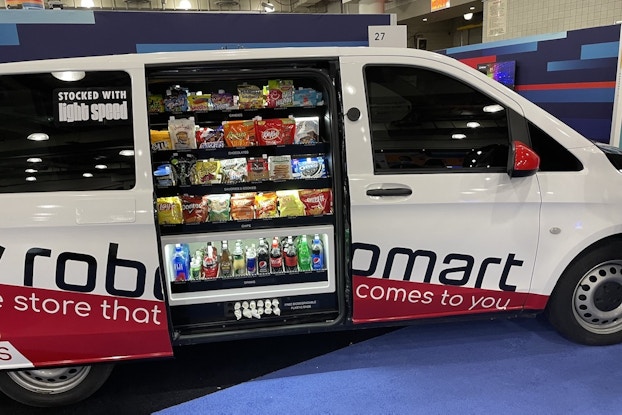
Why it matters:
- Consumers have shown during the pandemic that they are quick to adopt tech that will make their lives easier.
- Big retailers like Walmart are investing in and partnering with tech startups to explore drone deliveries to ‘store-hailing’ platforms to keep step with consumers’ changing demands.
- Many of the tech solutions being pioneered by major retailers will eventually be offered to smaller businesses by third-party, local providers.
The pandemic taught U.S. retailers a crucial lesson: The retailer with the best convenience-driven tech wins.
When COVID-19 first shut stores in 2020, retailers with online ordering, delivery and pickup and mobile apps already in place had a marked advantage over those who lagged on the tech front.


As a result, retailers are entering 2022 more willing to invest in tech than they have been in decades.
Consumers, said retailers who gathered for the National Retail Federation annual convention in New York in January, have shown they will quickly adopt new technology if it makes their lives easier. And that they will favor the retailer who does that best.
“Once a customer has been exposed to something better — things that save them time and take friction out of their lives – they tend to stay with it,” John Furner, president and CEO of Walmart, said during the convention.
That’s why Walmart, the nation’s largest physical retailer, is exploring everything from drone deliveries to virtual stores in the metaverse to keep up with the changing consumer.
While retail giants like Walmart, Target and Amazon are driving the development of new technologies, the long-term goal of the startups behind these innovations is to make them available to businesses of all sizes.
Exhibitors from around the world displayed their tech innovations at the NRF convention. Here are the tech trends poised to take off this year:
Drones that bring merchandise to your door
Walmart in November launched pilot drone deliveries at a store in Arkansas, near its headquarters in Bentonville. It is expanding the deliveries to additional stores, and could test it in other states as well.
The retailer has been testing drone deliveries for several years, and last year announced it had become an investor in DroneUp, a Virginia-based company founded in 2016.
DroneUp has developed software and mobile applications that enable retailers to manage drone deliveries. Representatives at the retail show said pilot programs have shown a high percentage of reorders from customers, who mostly are using the deliveries for convenience items they need quickly.
The global drone delivery market is expected to grow by more than 47% this year, to $3.49 billion, with studies showing drones can be a way to reduce carbon emissions in retail deliveries, according to a report by The Business Research Company.
[Read: 5 Consumer Trends Businesses Should Know in 2022]
Once a customer has been exposed to something better — things that save them time and take friction out of their lives – they tend to stay with it.John Furner, president and CEO, Walmart
Driverless delivery vans that shuttle goods from warehouse to store
Driverless delivery vans are another solution retailers are looking at for deliveries from warehouses to stores for curbside and store pickup, and eventually for home deliveries to consumers.
As more and more retailers use their local stores as fulfillment centers for online orders, they will need efficient ways to shuttle merchandise from regional warehouses to stores.
Walmart again is taking the lead in testing this technology. A company it has partnered with, Gatik, was one of several autonomous vehicle startups exhibiting at the show.
In Bentonville, Arkansas, Gatik’s driverless delivery trucks move goods from a former Walmart store that has been turned into an e-commerce fulfillment site, and a nearby Walmart store, for store pickup and store delivery orders.
Walmart and Gatik began by testing the vehicles with a safety driver, and in December 2020 won approval from the state of Arkansas to remove the human driver from the trucks.
Gatik, which has offices in Mountain View, California, and Toronto, has raised more than $114 million in funding and has partnered with automotive companies including Ryder trucks, Goodyear and Isuzu.
A store that comes to your home
What if instead of placing an order and picking it up at the store, you could place an order to have a store delivered to your doorstep?
Santa Monica, California-based Robomart, Inc. has created what it calls the first “store-hailing” platform that lets customers use their phones to call a drive-up store as easily as requesting an Uber ride.
Since June, customers in West Hollywood, California have been able to ask for a Robomart snacks van or a Robomart pharmacy van to come to their homes. The vans currently have drivers, but the customer uses the app to open the van’s doors, select the items they want to buy, and pay for them without any contact with a human driver.
The typical customer gets their merchandise within nine minutes, and some orders have been filled in under two minutes. Active users call a Robomart an average of two to three times a week.
Robomart is working on rolling out additional vans that can deliver groceries, ice cream and fast food.
Ali Ahmed, Robomart CEO and co-founder, told CO— that the goal is to have Robomart services around the country operated by local stores and entrepreneurs, with Robomart providing the platform. The company is using drivers in its vans now in order to get the vans on the road sooner, but the vans can be modified to operate driverless if that becomes widely accepted.
[Read: Amid E-Commerce Boom, Last-Mile Delivery Services Seek to Meet Pandemic-Fueled Consumer Demand]

A metaverse marketplace with virtual flagship stores selling virtual fashions
Retailers increasingly are realizing that the successful retail website of the future will not only be a static place to buy products, but will also be a place for consumers to hang out and to interact with, learn about and play with products.
More than 80% of consumers believe a brand’s digital presence is as important as its physical presence. That’s prompted brands to enhance their e-commerce storefronts and even its virtual flagship stores, marketing agency Wunderman Thompson said in its report, Into the Metaverse.
Luxury fashion brand Fendi, for one, launched a virtual version of its New York 57th Street store, and numerous brands including Gucci, Burberry and Ralph Lauren have created virtual stores, and even made virtual versions of their fashions available for sale, to be worn in the metaverse – a virtual recreation of the physical world – and the trend that generated the most buzz at this year’s retail show.
Obsess has been creating virtual store platforms for retailers since 2017, but has seen demand for its tech explode during the pandemic.
It has created virtual stores for more than 80 brands. For Coach, it created a digital twin of its New York flagship store, and for beauty brand Mary Kay, which doesn’t have physical stores, it created a virtual flagship. For Unilever skincare brand Dermalogica, it created a virtual store where visitors can find information about products and skin treatments.
Smart tags and self-checkout tech that track what consumers like — and don’t
The first thing visitors to the retail show spotted was a 1,000-square-foot “Just Walk Out” convenience store powered by Amazon’s self-checkout technology.
A number of startups are looking to take self-checkout to the next level, with options designed to work for more complex shopping experiences than grabbing a bag of chips or a can of soda.
Nexite, a Tel Aviv-based company, has developed a smarter apparel tag that can be deployed not only to facilitate self-checkout, but that could be used to collect data on how customers interact with merchandise in stores, and provide a way to stay connected with customers after they leave the store.
The startup has created a patented tag that can be sewn into clothes, similar to a care instruction tag, and transmit data to in-store sensors, allowing for better in-store tracking of merchandise. The tags, which are washable, can also function as a permanent identifier for luxury goods and as a way for consumers to use their phones to opt in for more information from the retailer or the brand.
Willy Rotstein, Nexite’s chief commercial officer, told CO— that the tags can be used for self-checkout and returns, eliminate the need for bulky security tags and collect store data for retailers on which items are being abandoned in fitting rooms and where merchandise is located in any given store. They also can authenticate merchandise for the growing luxury resale market, he said.
A trial of the Nexite platform at a fashion retailer in Israel demonstrated how the tags collect data on how customers interact with merchandise in the store, tracking rates of product engagement and abandonment.
CO— aims to bring you inspiration from leading respected experts. However, before making any business decision, you should consult a professional who can advise you based on your individual situation.
Follow us on Instagram for more expert tips & business owners’ stories.




